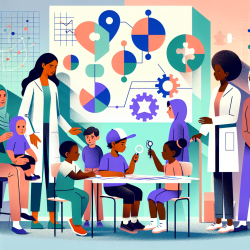Introduction
As a practitioner in speech-language pathology, making informed decisions based on data and evidence is crucial to achieving the best outcomes for children. A recent study titled "Predicting Outcomes in a Sequence of Binary Events: Belief Updating and Gambler's Fallacy Reasoning" by K. Rao and R. Hastie provides insights into cognitive biases and belief updating that can be leveraged to enhance decision-making processes in therapy settings.
Understanding Belief Updating and Cognitive Biases
The research delves into how individuals predict outcomes in sequences of binary events, such as a coin flip or a child's response to a therapy task. It highlights two cognitive biases: the "hot hand" belief, where people expect streaks to continue, and the "gambler's fallacy," where they expect streaks to reverse. The study found that these biases are influenced by the perceived randomness of the event and the observer's mental model of the sequence-generating process.
Applying Research Insights to Practice
Incorporating these findings into speech-language pathology practice can enhance how practitioners set expectations and interpret children's responses during therapy. Here are some actionable strategies:
- Recognize Cognitive Biases: Be aware of your own biases when predicting a child's performance. Understanding that expectations of streaks can be influenced by perceived randomness can help you set more realistic goals.
- Utilize Belief Updating: Continuously update your expectations based on the child's performance data. This aligns with the study's findings that belief updating is a pragmatic cognitive process that can lead to better predictions.
- Customize Interventions: Tailor interventions based on the child's unique response patterns rather than relying on generalized expectations. This personalized approach can lead to more effective therapy outcomes.
Encouraging Further Research
The study opens avenues for further research in understanding how belief updating can be systematically applied to improve therapeutic interventions. Practitioners are encouraged to explore how these cognitive processes can be integrated into clinical practice to enhance decision-making and outcomes for children.
Conclusion
By understanding and applying the principles of belief updating and recognizing cognitive biases, speech-language pathologists can make more informed decisions that lead to better outcomes for children. Embracing data-driven approaches and continuous learning from research will empower practitioners to provide the highest quality of care.
To read the original research paper, please follow this link: Predicting Outcomes in a Sequence of Binary Events: Belief Updating and Gambler's Fallacy Reasoning.










